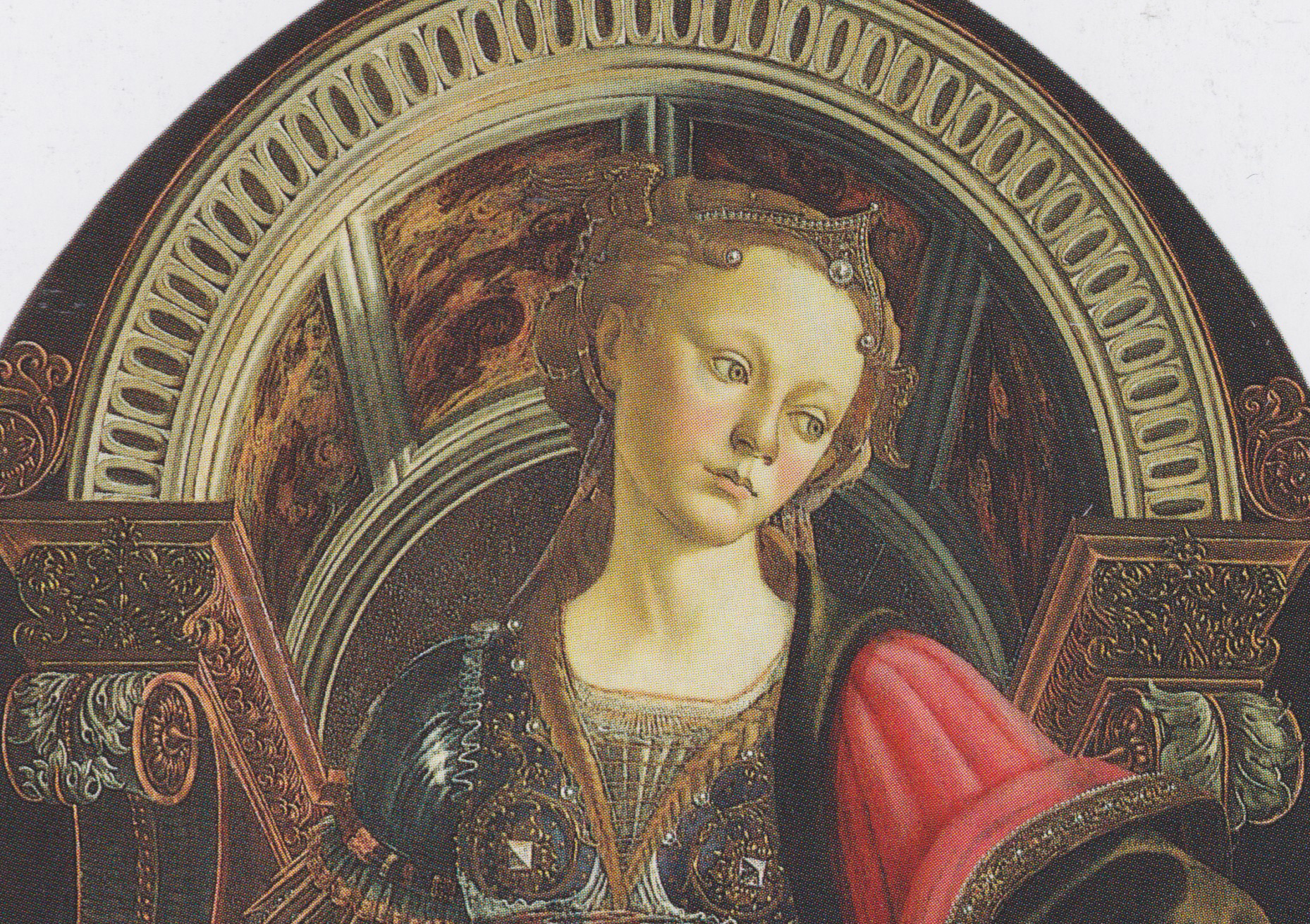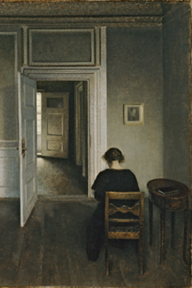
Detail of Fortitude, Sandro Botticelli, 1470
Let me start by describing a recent experience. About a year ago, around Christmas, I briefly fell ill. It was, as we now say, a garden-variety case, a common virus, open-and-shut. A few days on, I felt fully recovered. Then, in the days that followed, a cascade of unusual symptoms began to set in. First it was my concentration that began flickering; I noticed a sudden difficulty keeping up a sequence of thought. There was a strange sense of sensory overload when I was outdoors, linked to a more general feeling of confusion. As time passed, different parts of my mind started falling away. I was struggling to read or compute the simplest ideas. My attention would skid and my mind would slump back in fatigue. I found it difficult to speak; connecting to others became a challenge. Many of the intellectual activities that previously filled my days became impossible. My ordinary sense of self began to unravel as my internal world underwent a progressive bleaching that spread from my cognitive powers to my will and emotions. I struggled to get started on anything, particularly if it had any element of novelty. Once started, I struggled to keep going; intentions passed liked clouds. Every day I would set modest goals that I would never complete, whittling down my normal activities to increasingly smaller yet still unachievable units. Every kind of meaningful activity seemed foreclosed. For a long time, all I could look forward to on any given day was the satisfaction of basic physical needs. Although I was able to maintain physical exercise—normally I run and swim—there were times when it felt like a miracle that I was managing to move through space, let alone run. It seemed as though any moment now my will to move could suddenly give way and I would crumple to the ground. At certain times, the feeling was the gritty one of grief, which almost carried a sense of fullness. More often, it was not about what I felt but about what I didn’t. Experience didn’t lack positive differentiations; it lacked any differentiations whatsoever. A sense of emptiness crept over me that made everything seem blank. At some fundamental level, it felt as if I wasn’t there. It was as if I had no soul. Simply enduring in this vacant state of being was almost intolerable.
Throughout this period, I was haunted by a sense that there had to be some action I could take that would turn things around—it was in my hand to improve things, if only I could hit upon the right strategy and sustain it. But even more strongly, I was haunted by the sense that there had to be some attitude I could take toward what was happening, some way of disposing myself toward it, that would represent a better way of handling it. My sphere of action had contracted dramatically, but surely I could not be entirely powerless. There was one action still open to me: to respond to the facts beautifully. Through the peak of it, I was unable to discover that beautiful attitude. Eventually, day broke, and I was able to return to my usual activities.
Different readers may find different elements to recognize in this account, which presents just one of many possible pictures of illness. Illness takes a range of unhappy forms, sometimes impacting more directly on the body and other times on the mind. Sometimes, as in this case, an originally somatic cause gives rise to impairments of a cognitive and emotional kind. Whatever its particular profile, illness confronts us with new limitations that challenge us in a host of different ways. The challenges will vary depending on its severity, duration, and specific nature, but it may often exact far-reaching adjustments in our day-to-day lives, our relations with others, and our self-understanding. At its most profound, it can dramatically alter how we think of who we are and what matters.
Seen from this viewpoint, illness has sometimes been said to harbor a potential for positive transformation. Writing about the topic in the backdrop of her own personal struggles with illness, Bristol philosopher Havi Carel cites research that suggests that people who suffer illness have a more “developed sense of self, a stronger sense of their priorities, more authentic relationships, and a better ability to resist petty upsets.” They demonstrate better self-knowledge, a heightened sense of purpose, and a greater appreciation of time. Illness can push people into positive new responses and creative adaptations that involve discovering new sources of significance. These kinds of changes, another philosopher suggests, can be seen in terms of what moral philosophers would describe as our moral character. Posing the question in a recent piece, “Can illness be edifying?” Ian Kidd answers a resounding yes. “Illness can afford opportunities to cultivate virtues,” such as patience, humility, or trust. In this sense, illness can be an opportunity for moral growth.

Interiør, Strandgade 30, Vilhelm Hammershøi, 1906–8
This intuition has a long history. In philosophy, it has often appeared as part of a more general reflection on the problem posed by the role of luck in human life. Is our ability to lead a good life entirely in our power or does it depend on luck, so that uncontrollable misfortunes like the loss of our possessions, our loved ones, or our health can prevent us from achieving it? Ancient philosophers took human character to provide a large part of the answer. Taken from one direction, our character exhibits itself most clearly in adversity, and a good character helps us handle adversity in the best possible way. “[T]he truly good and sensible person,” as Aristotle puts it, will bear “what fortune brings him with good grace” and act “in the finest way,” so that “the quality of fineness shines through” even in the gravest misfortunes. In this sense, character can be a kind of shield against adversity. Taken from another direction, adversity can itself serve as a school for character. “[W]hen trouble comes,” as Stoic philosopher Epictetus advises, “think of yourself as a wrestler whom God, like a trainer, has paired with a tough young buck.”
The idea that adversity can positively transform us has also had strong resonance among religious traditions. Among other things, it has played an important role in theological attempts to come to terms with the problem of evil. One of the best-known examples is the “soul-making” theodicy elaborated by philosopher of religion John Hick, for whom suffering is a necessary feature of a world created with the purpose of “realizing... the most valuable potentialities of human personality.” Moral and spiritual growth always comes as “a product of challenge and response.” Difficulties create the space for moral choice, and effortful choices eventually stabilize into a “positive and responsible character.”
I was familiar with many of these ideas prior to becoming ill. What had always impressed me most was the form given to them by the Stoics, who took Aristotle’s point that character can help us handle misfortunes well one step further by declaring that character can actually make us invulnerable to them. There are, to be sure, things in our lives that we can’t control. But the one thing we can control is the attitude we take to these things. That power can never be taken away from us. That is a power to decide whether or not to attach value to external things, and it lies in our reason. The exercise of this power is in fact the only thing that truly matters. All other apparent goods, which are hostage to fortune, are indifferent. Once we realize this, we realize that misfortunes can never really affect us. “Things cannot touch the soul,” as the Stoic emperor-philosopher Marcus Aurelius declares; it is situated “above the tangled web of Destiny.” Let the storm outside rage all it wants; the higher part of our soul forms our “inner citadel.”
It is not hard to see why this picture has been so seductive down the ages, and why Stoic philosophy continues to attract a large popular following to this day. Taken at face value, it suggests that there is no such thing as being purely passive or completely powerless before anything that befalls us. There is always a certain kind of agency available to us that allows us to create value—moral value—even in the harshest conditions. There is dignity in this picture, and not a small measure of heroic hauteur, which is brought out even more clearly by other Stoics. Here’s Seneca: we should “stand ready and confident, squaring the breast to take without skulking or flinching whatever fortune hurls at us.” Our spirit is “above all things; it should accordingly give in to nothing; in nothing should it see a burden calculated to bow the shoulders of a man.”
Looking back, it is clear to me that these kinds of ideas were working in the background of my thinking during the time I was unwell. I was indebted to them for the haunting sense I had throughout about how I might be able to handle the circumstances differently—more beautifully or graciously. Some kind of agency had to be open to me. I just needed to find it.
The fact that someone was unable to apply a principle successfully, of course, says nothing about the intrinsic merits of this principle. But as I took stock of things on the morning after, my experience crystallized a sense of unease with these philosophical theories that wasn’t entirely new to me and that I now felt a stronger need to work out. Was the picture of human agency presented by these philosophers ultimately realistic? Is it really the case that character can always be exercised—that moral choices can be made—under conditions of significant suffering? Which is a way of asking: Is there always room for ethics? I might not have gotten it right while I was unwell, but maybe if I could work out my answers to these questions now that I again had the cognitive ability, I would have better tools at my disposal the next time around.